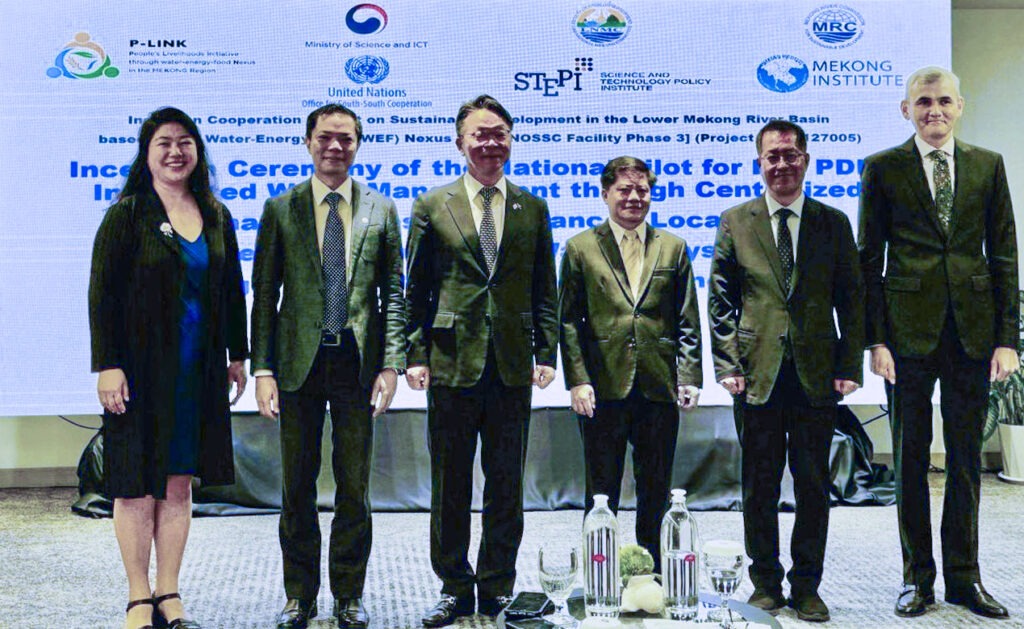Vientiane, Lao PDR: On June 28, 2024, an important ceremony marked the beginning of a transformative project entitled, “Integrated water management through centralized national facilities and enhanced local flood forecasting and early warning system in Xebangfai river basin in Khammouane Province”, which aims at improving water, energy, and food management. The ceremony was co-organized by the Ministry of Natural Resources and Environment (MONRE), the Lao National Mekong Committee Secretariat (LNMCS), the Mekong River Commission Secretariat (MRCS), and the UN Office for South-South Cooperation (UNOSSC), represents a significant step forward in integrated water management and flood forecasting.
A Collaborative Effort for Sustainable Development
This initiative is part of a larger collaborative project titled “Triangular Cooperation on Sustainable Development in the Lower Mekong Basin based on the Water-Energy-Food (WEF) Nexus.” This project, also known as “RoK-UNOSSC Facility Phase 3” and P-LINK, is a joint effort between UNOSSC, the Republic of Korea (ROK)’s Ministry of Science and ICT (MSIT), and the Mekong River Commission (MRC). Its goal is to enhance access to water, food, and energy for vulnerable communities across Cambodia, Lao PDR, Thailand, and Vietnam through innovative and integrated approaches.
Objectives and Implementation
The Lao PDR pilot project aims to establish an integrated climate and water monitoring system to strengthen weather forecasting and early warning capabilities. Over 16 months, the project will:
- Provide advisory services for the design of a National Water Resources Data Management Center (NWRDMC) and the development of mid- and long-term plans.
- Install hydrological gauge stations and early warning posts, and develop a real-time information system.
- Facilitate capacity building and knowledge sharing to ensure local ownership and sustainability.
A consortium of ROK technology experts will support these efforts, ensuring the transfer of necessary skills and knowledge.
Inception Ceremony Highlights
Over 40 representatives from various ministries, public institutions, local governments, intergovernmental organizations, and UN agencies attended the ceremony. Key speakers included:
- Phonepaseuth Phouliphanh, Secretary General of LNMCS, who thanked the Republic of Korea and project team for their support.
- Anoulak Kittikhoun, MRCS CEO, emphasized the importance of long-term project sustainability to address climate change challenges and hope that the data generated at sub-region by the Mekong River Commission could be applied and translated by Lao national stakeholders to support community early warning system in Nakio village, pilot site.
- Xiaojun Grace Wang, UNOSSC Trust Fund Director, highlighted the value of triangular cooperation in delivering impactful results by offering new approaches of working as demonstrated by P-LNK. The project showcases multi-sectoral and public-private partnership modalities to deliver appropriate and innovative solutions and capacity building to the community. The project will continue to advocate the importance of integrated development and facilitate South-South sharing of knowledge and experiences among participating countries and beyond.
- Sunghoon Hwang, Director General of MSIT, who commended the project’s comprehensive approach and reassured the project to the pilot to deliver meaning and tangible results to enhance livelihoods of the Mekong communities.
- E. Mr. Young Soo Jung, Ambassador of the Republic of Korea to Lao PDR, expressed his hopes for the project’s success to and its potential to strengthen ROK-Mekong and ROK-ASEAN cooperations.
- Seung Woo Yang, Acting President of the Science and Technology Policy Institute (STEPI) of ROK, praised the collaborative efforts of all stakeholders involved to design solid work on the ground and hope to witness how policy can be translated into actions to support people.
- Bakhodir Burkhanov, UN Resident Coordinator in Lao PDR, highlighted that project’s integrated development approach covers three critical priorities in Lao PDR for the country’s development: water, energy and food. He also indicated as the project is aligned with the global “Early Warnings for All” (E4ALL) Initiative, it has clear opportunity to leverage synergies to progress towards country-wide early warning coverage by 2027.

From left to right, Ms. Xiaojun Grace Wang, Dr. Anoulak Kittikhoun, H.E. Mr. Young Soo Jung, Mr. Phonepaseuth Phouliphanh, Dr. Seung Woo Yang, Mr. Bakhodir Burkhanov
Discussions and Future Plans
Participants discussed challenges related to water, energy, and food management in Lao PDR, the role of Science, Technology, and Innovation (STI) in the WEF Nexus approach, and shared experiences and best practices through presentations and panel discussions. They also highlighted the benefits of South-South and Triangular Cooperation (SS & TrC) in technical transfer and knowledge sharing.

Looking Ahead
National pilots for Cambodia, Thailand, and Vietnam are also underway, with their launch events scheduled for July and August 2024. This project represents a significant step towards sustainable development in the Lower Mekong Basin, promising improved livelihoods and resilience for the region’s communities.

